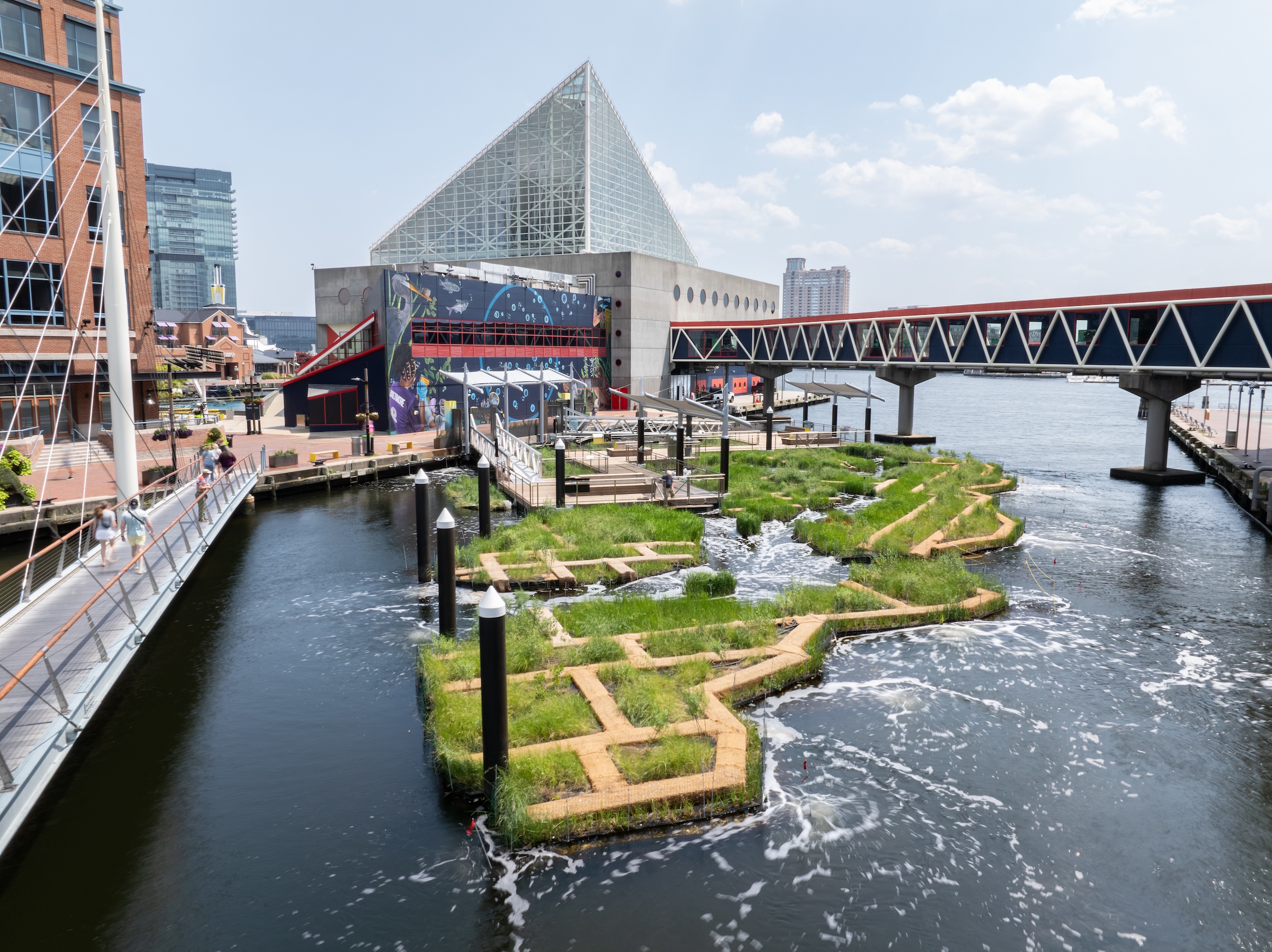The National Aquarium in Baltimore has opened the National Aquarium Harbor Wetland, a 10,000-sf floating wetland that mimics the Inner Harbor’s original Chesapeake Bay tidal marsh habitat. Located between Piers 3 and 4 on Baltimore’s Inner Harbor, the $14 million project features more than 32,000 native shrubs and marsh grasses.
With Ayers Saint Gross as the architect of record and Whiting-Turner as the construction contractor, the project is based on sustainable innovations developed by the Aquarium’s conservation and exhibit fabrication teams. At the project’s start about a decade ago, Studio Gang participated as the original concept architects.
“Harbor Wetland is the culmination of 12 years of research, innovation, and determination,” Aquarium president and CEO John Racanelli said in a press statement.
Ayers Saint Gross worked with the National Aquarium to design a sustainable, high-performing floating wetland intended to restore natural habitats and improve biodiversity and water quality. The project aims to reverse years of environmental degradation while creating a renewed, thriving ecosystem. The design features layered topography, with planting surfaces at tiered elevations to promote a variety of microhabitats and attract a greater diversity of species to the area.
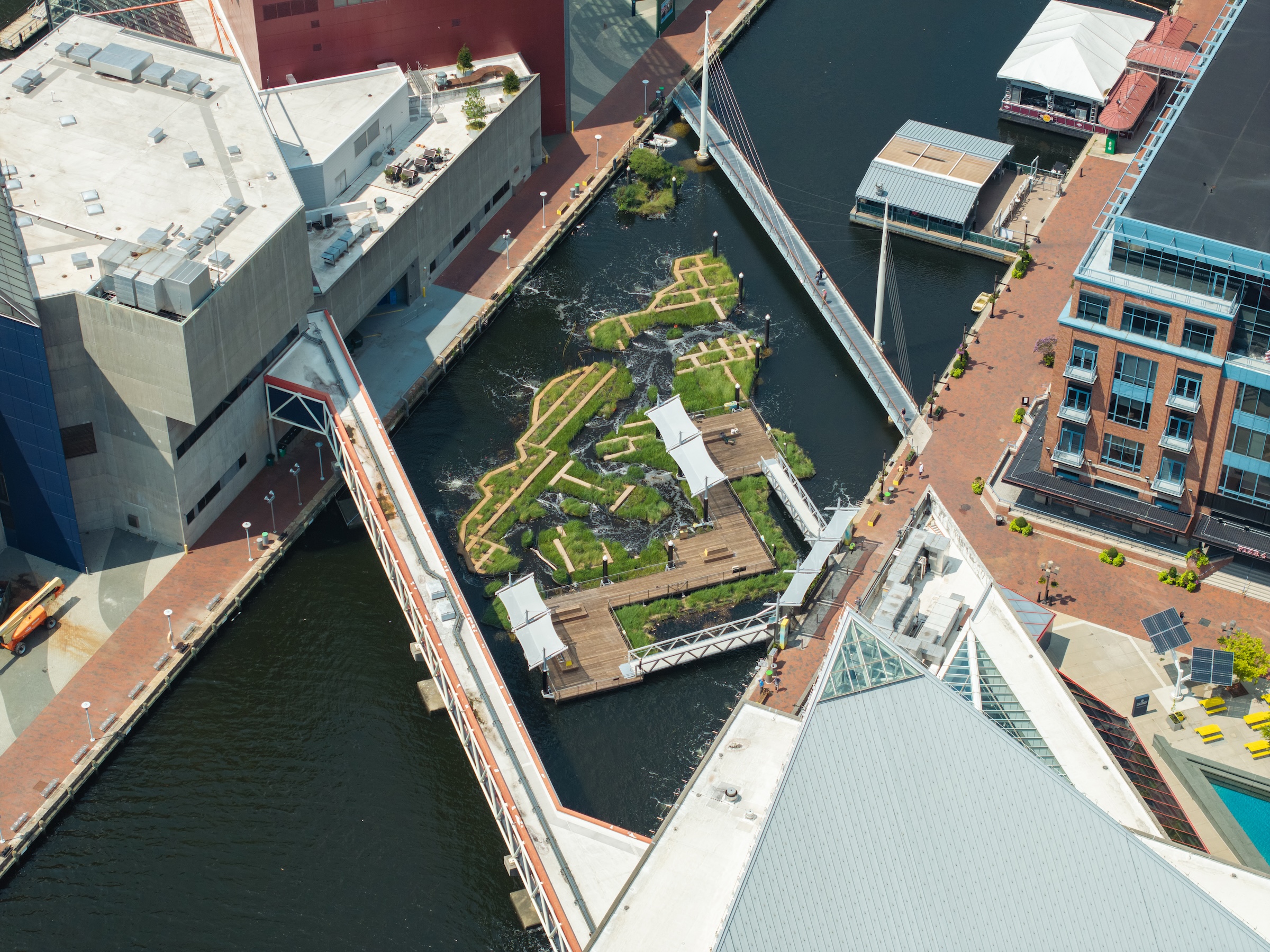
Free and open to the public, the constructed wetland serves as a floating classroom for the community. Interpretive signage allows guests to learn about the wetland, the species drawn to it, seasonal changes, and the surrounding harbor.
Featuring docks, walkways, and shade cover, the habitat is composed of recycled plastic matting planted with native tidal wetland shrubs and grasses, whose roots will grow down into the water. This provides microhabitats for native species while drawing nutrients and contaminants from the water. Coated with a UV protectant for durability, the matting is fixed to a system of air-regulated pontoons that allow for adjustable buoyancy of the wetland, offsetting weight gain from growing biomass.
Compressed air is pumped into the channel to circulate water through the wetland’s shallow channel. Bubbles from the compressed air release oxygen into the water—benefiting aquatic species and keeping water moving through the wetland as it would during tidal changes in a natural tidal marsh.
“We hear so much negative talk about Inner Harbor water quality, but there is life in this water and there always has been,” Jack Cover, the Aquarium’s general curator, said in the statement. “My hope is that when people see the life this wetland attracts, from tiny microorganisms to fishes, crabs, water birds, and even small mammals like muskrats and otters—all of which we’re already seeing here—they might reconsider our local waterways and perhaps even take better care of our natural surroundings.”
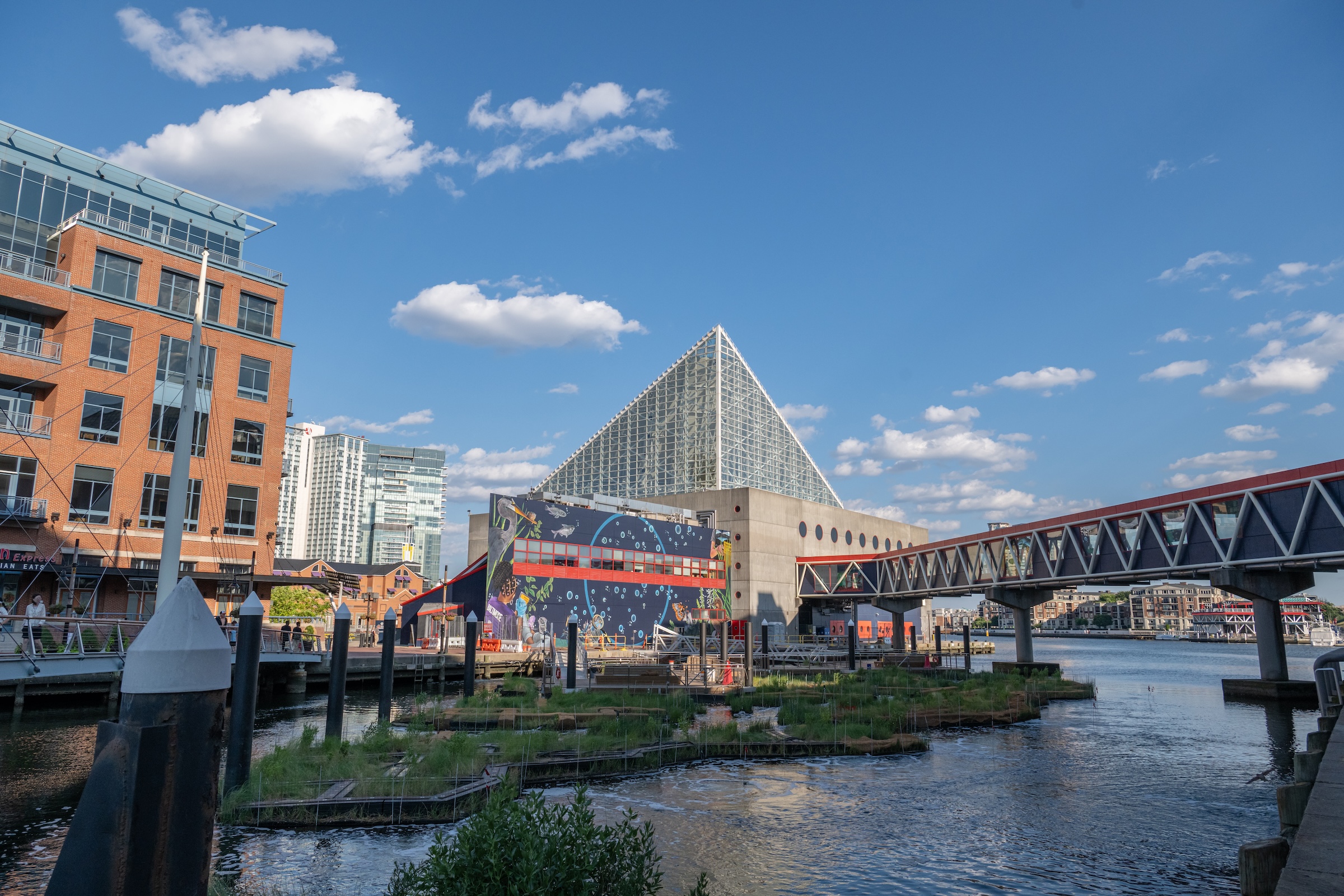
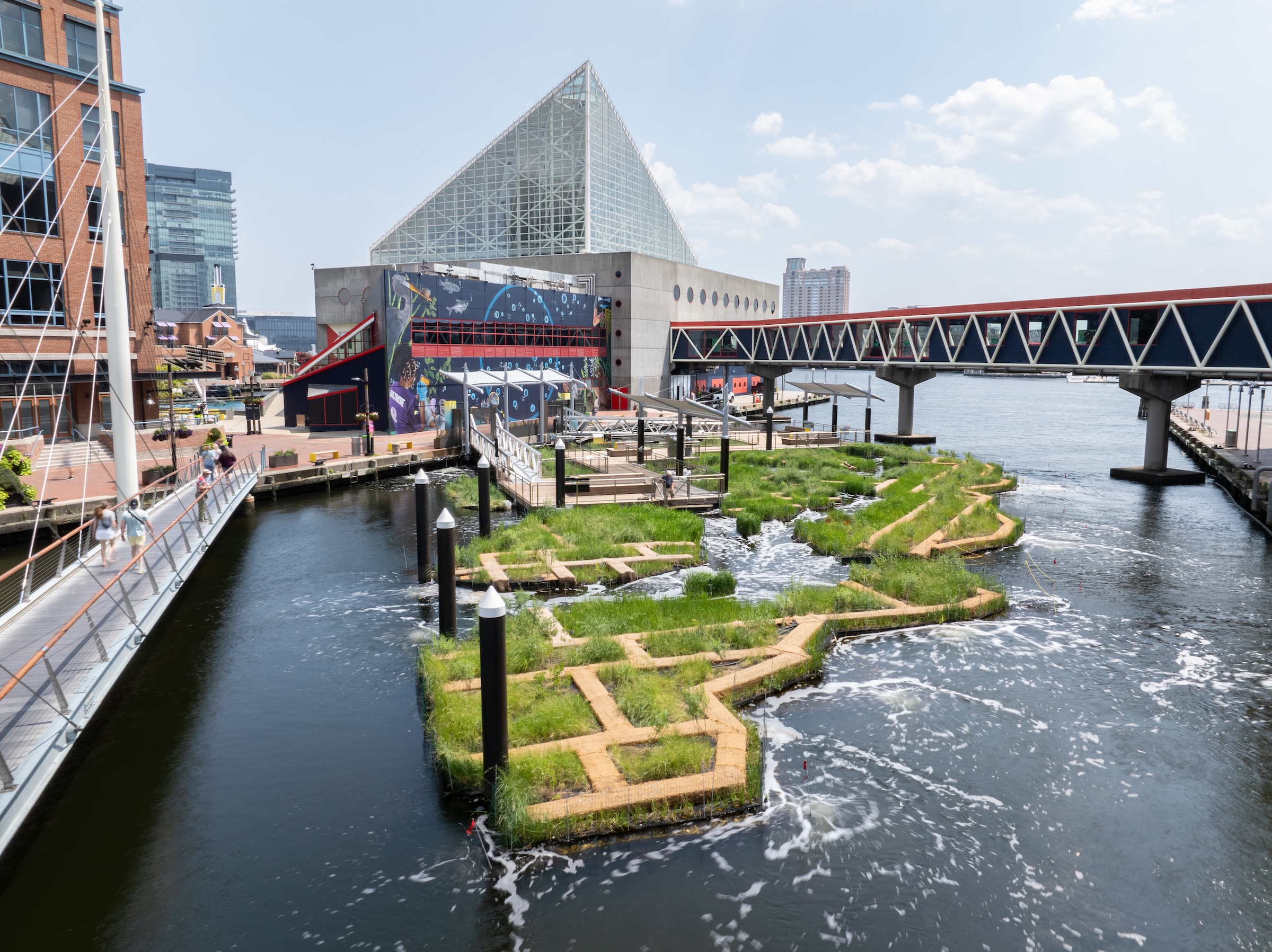
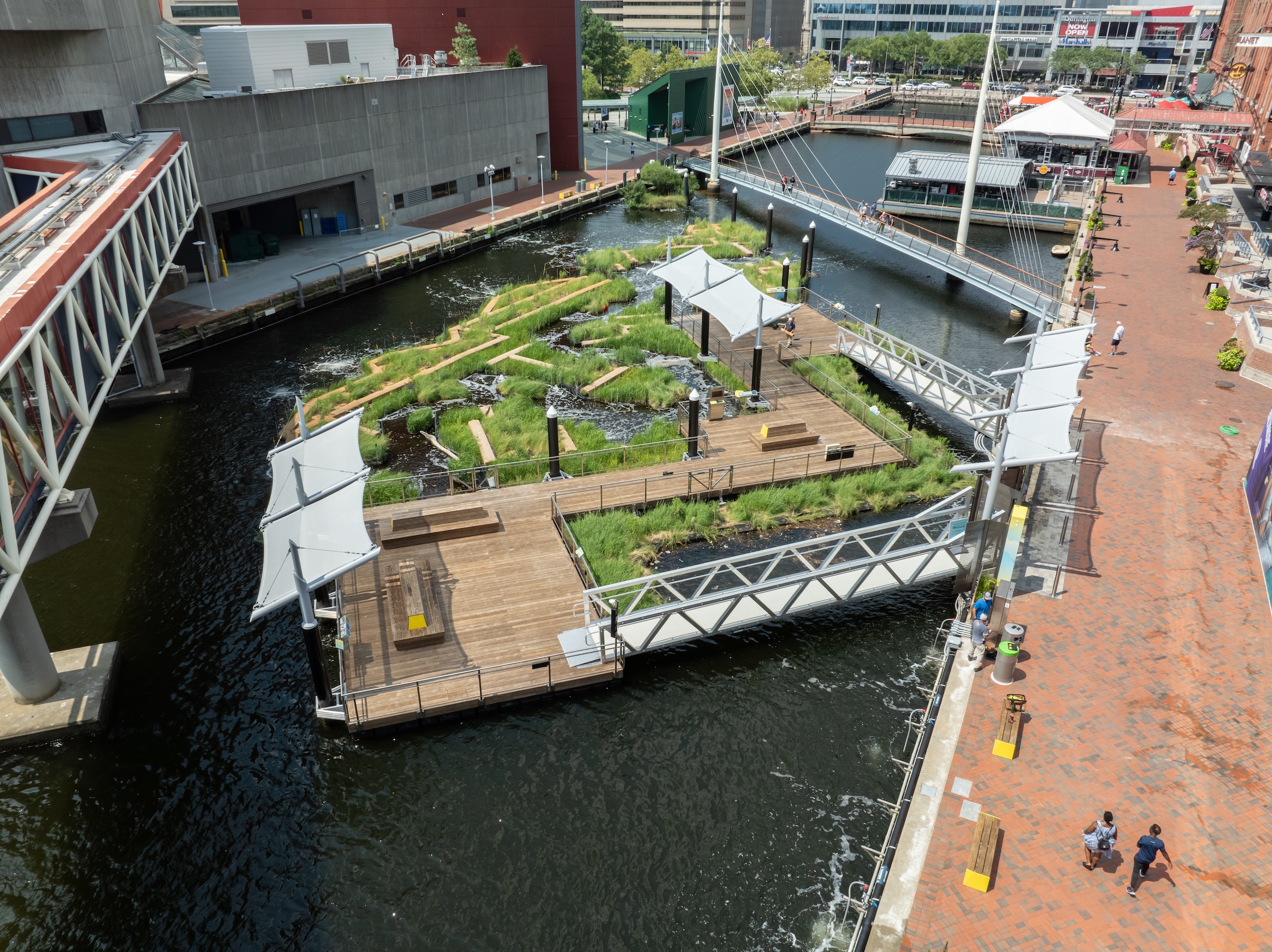
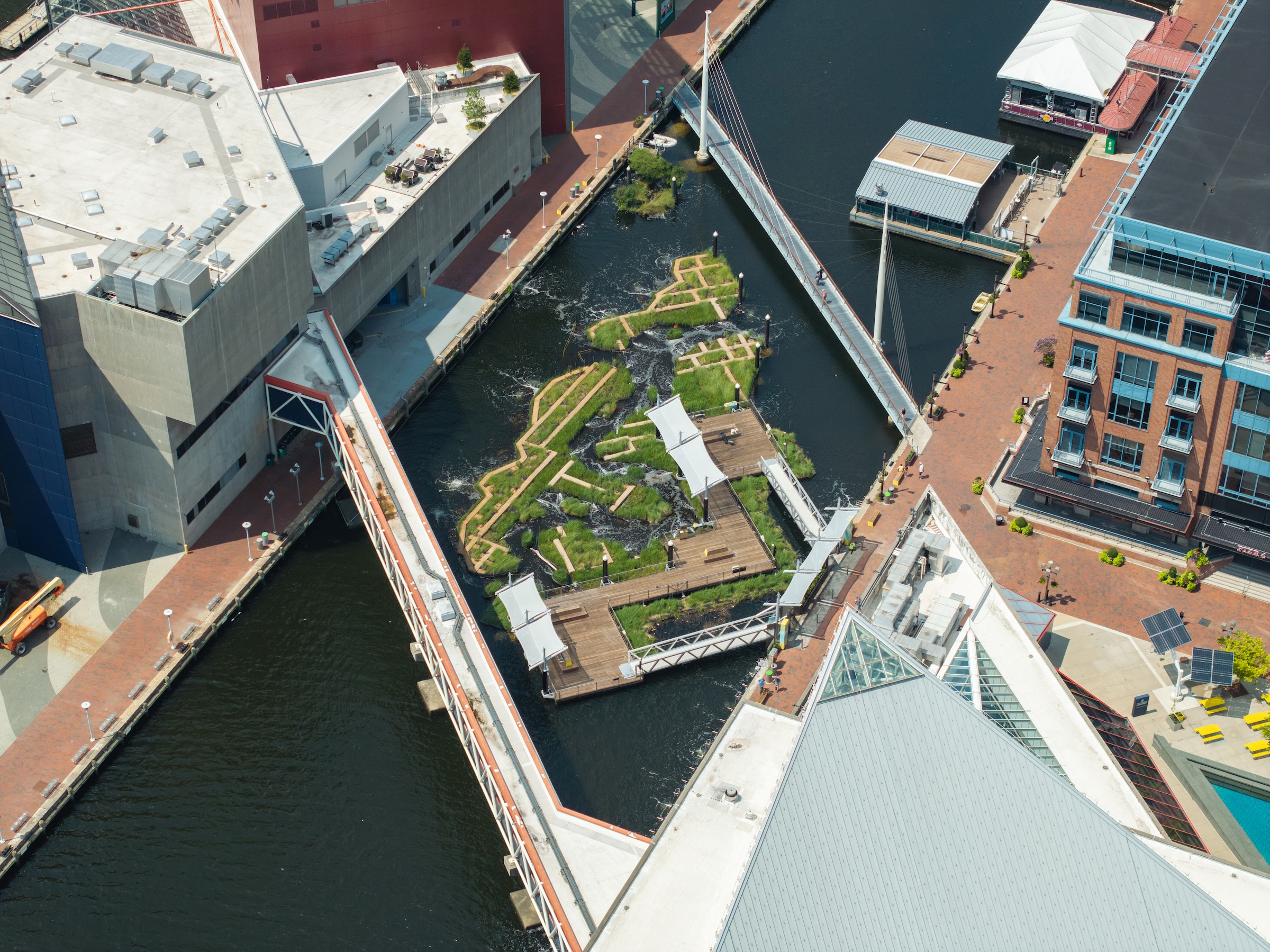
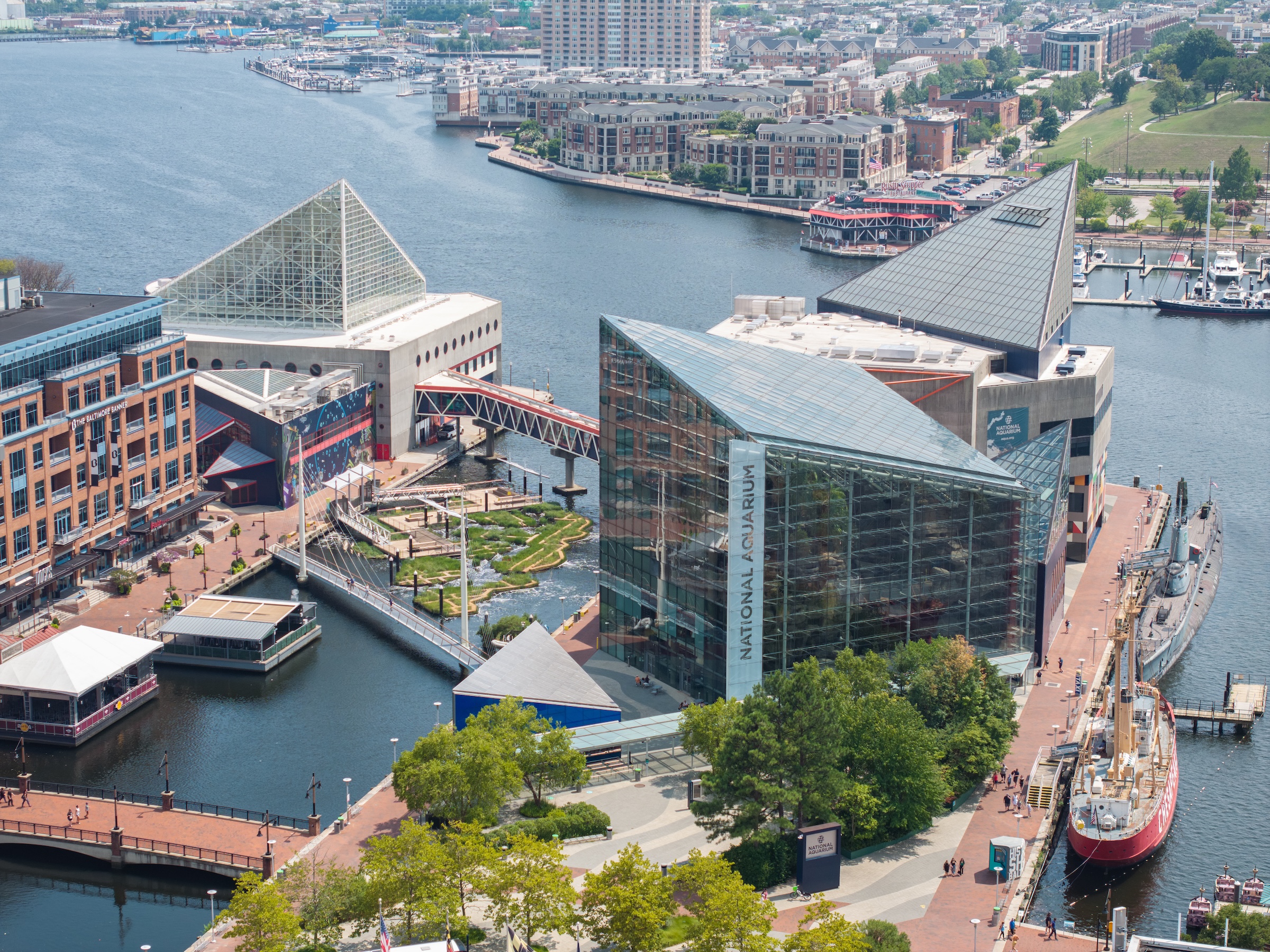
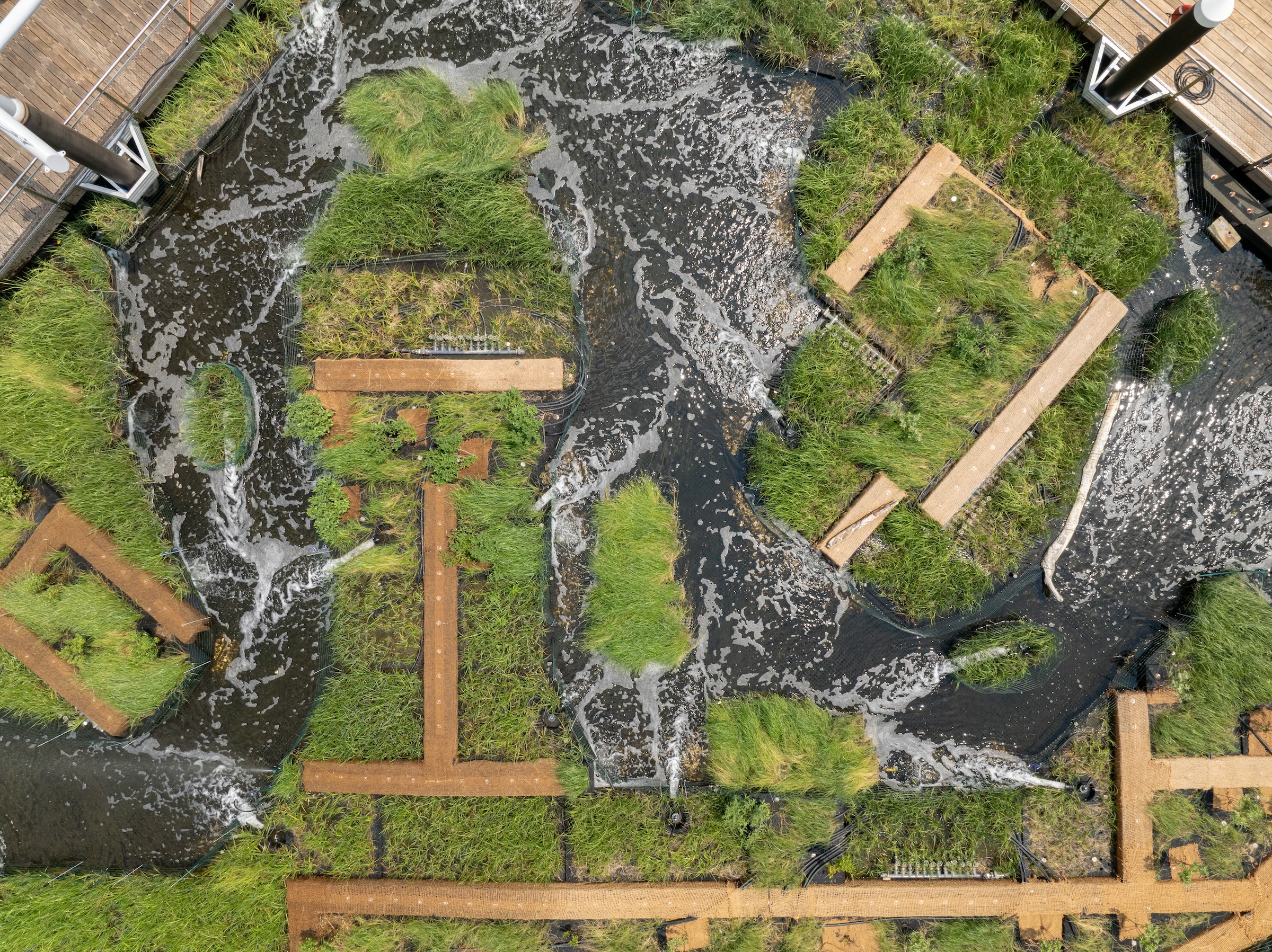
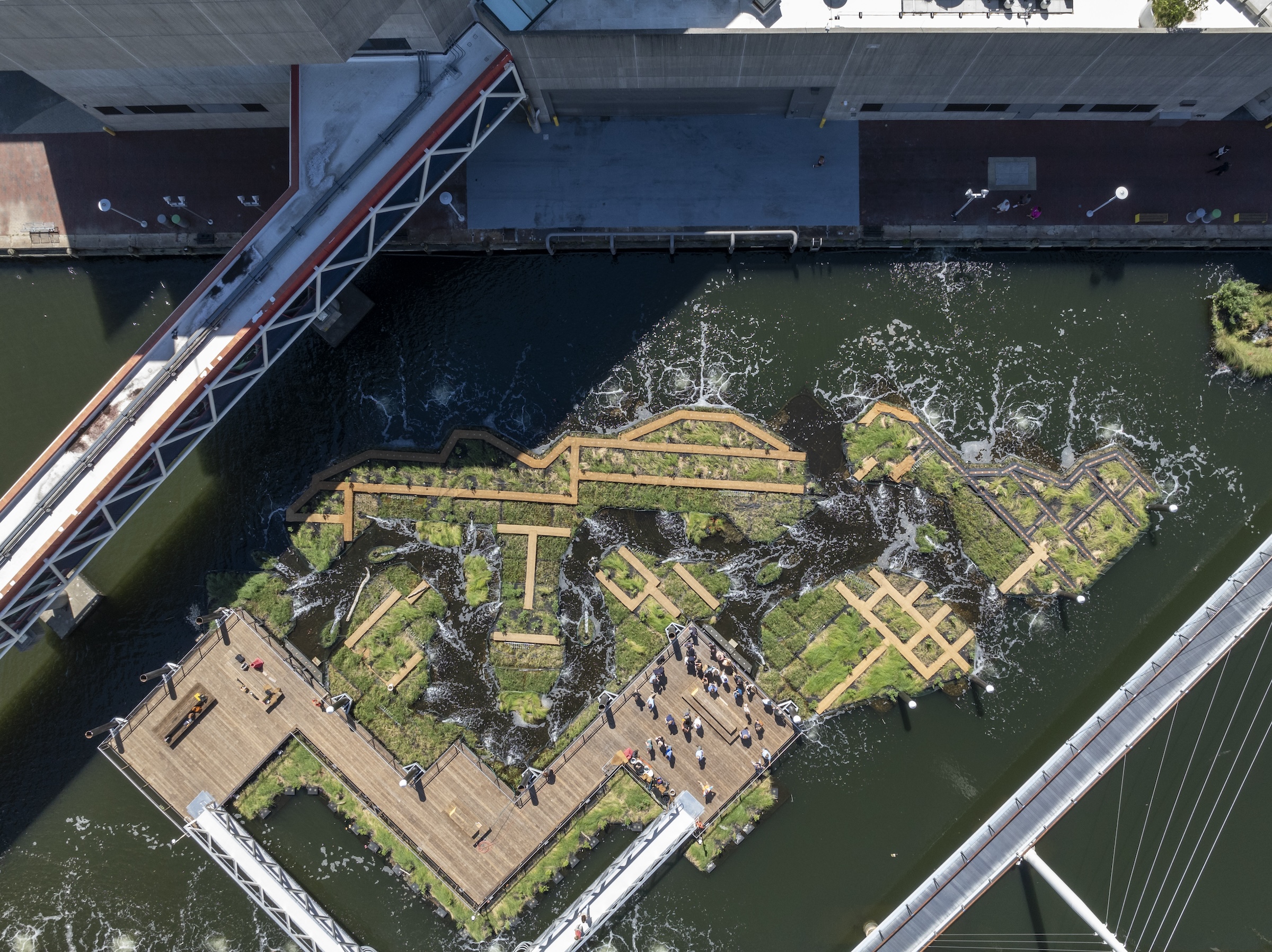
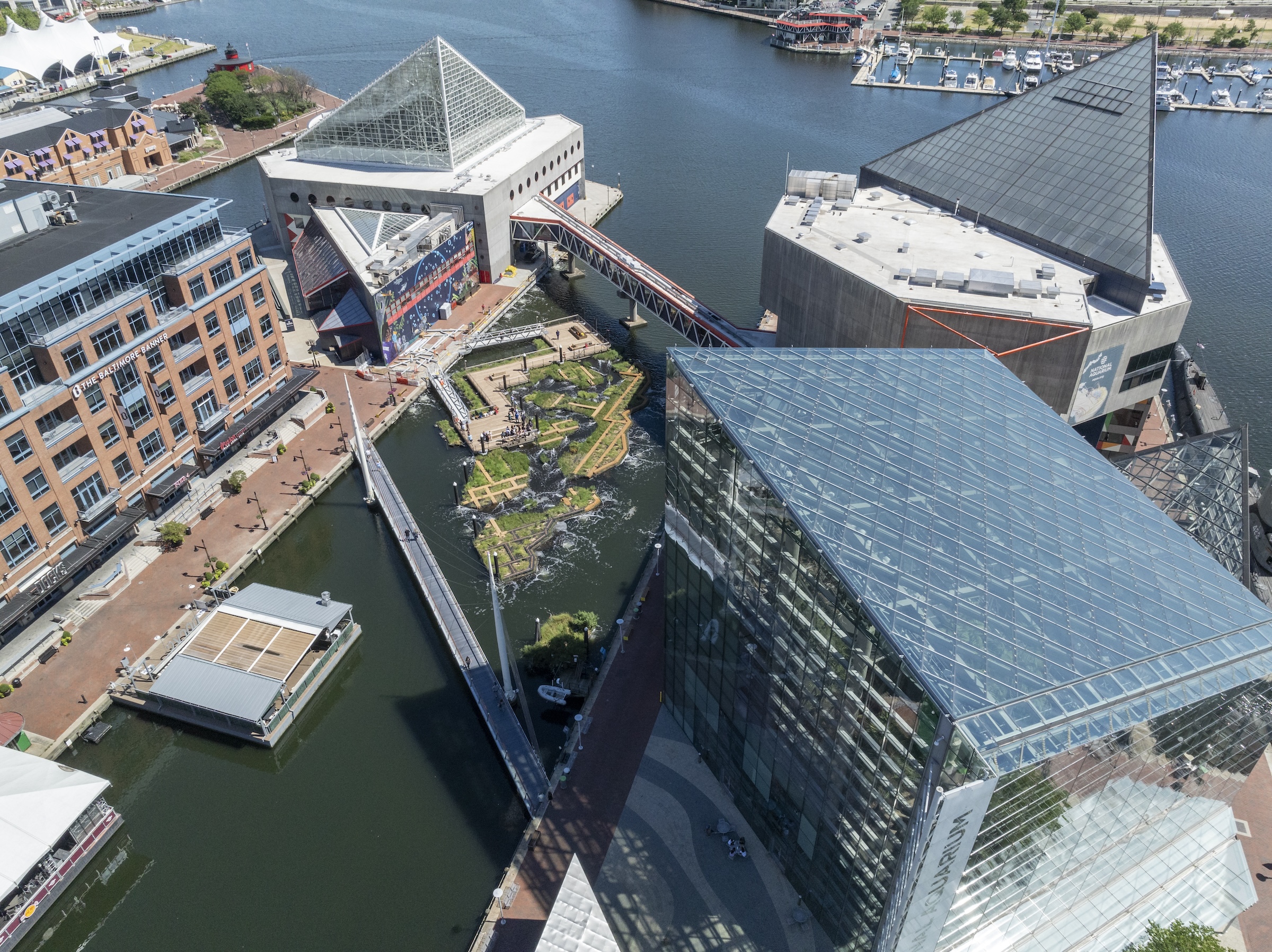
Related Stories
| Aug 11, 2010
Community college’s hillside learning center
The Earl E. and Dorothy J. Dellinger Learning Resource Center at Southwest Virginia Community College in Richlands, Va., is the centerpiece of this mountainside school. Designed by Arlington, Va.-based The Lukmire Partnership, the 50,000-sf, two-story building connects the upper and lower campuses, which are separated by a 70-foot vertical grade change.
| Aug 11, 2010
Thom Mayne unveils ‘floating cube’ design for the Perot Museum of Nature and Science
Calling it a “living educational tool featuring architecture inspired by nature and science,” Pritzker Prize Laureate Thom Mayne unveiled the schematic designs and building model for the Perot Museum of Nature & Science at Victory Park in Dallas. The $185 million, 180,000-sf structure is 170 feet tall—equivalent to approximately 14 stories—and is conceived as a large...
| Aug 11, 2010
BIG beats out Foster and Hadid in design competition for Kazakhstan's National Library
Invited as one of five pre-selected architect-led teams that included Lord Norman Foster and Zaha Hadid, Copenhagen-based BIG was awarded first prize in an international design competition for the new National Library in Astana, Kazakhstan. The 33,000-square-meter facility will be organized as a “circular loop of knowledge” that allows for clear, intuitive orientation of the vast co...
| Aug 11, 2010
Broadway-style theater headed to Kentucky
One of Kentucky's largest performing arts venues should open in 2011—that's when construction is expected to wrap up on Eastern Kentucky University's Business & Technology Center for Performing Arts. The 93,000-sf Broadway-caliber theater will seat 2,000 audience members and have a 60×24-foot stage proscenium and a fly loft.
| Aug 11, 2010
Dallas Center for the Performing Arts opens
The Dallas Center for the Performing Arts, a new multi-venue center for music, opera, theater, and dance, will open this month, completing the 25-year vision of the Dallas Arts District. Foster + Partners, Rem Koolhaas, Joshua Prince-Ramus, and Skidmore Owings & Merrill are among the architecture firms involved in the development, which includes four venues unified by a 10-acre park.
| Aug 11, 2010
TCF Bank Stadium first new football stadium to get LEED certification
The University of Minnesota has received LEED Silver certification for its 50,805-seat TCF Bank Stadium, making it the first new football stadium in the country to achieve LEED status. Designed by Populous, Kansas City, Mo., the facility features a stormwater management system that captures and stores rainwater in an underground filtering system, where it is harvested, filtered, and drained int...
| Aug 11, 2010
Construction begins on Louisiana State Sports Hall of Fame
Heavy construction and foundation work has started on the new Louisiana State Sports Hall of Fame and Regional History Museum in Natchitoches, La. Designed by Trahan Architects, Baton Rouge, the $12 million, 28,000-sf museum will be clad in sinker cypress planks as a nod to the region’s rich timber legacy and to help control light, views, and ventilation throughout the facility.
| Aug 11, 2010
Modest recession for education construction
Construction spending for education expanded modestly but steadily through March, while at the same time growth for other institutional construction had stalled earlier in 2009. Education spending is now at or near the peak for this building cycle. The value of education starts is off 9% year-to-date compared to 2008.
| Aug 11, 2010
Manhattan's Pier 57 to be transformed into $210 million cultural center
LOT-EK, Beyer Blinder Belle, and West 8 have been selected as the design team for Hudson River Park's $210 million Pier 57 redevelopment, headed by local developer Young Woo & Associates. The 375,000-sf vacant passenger ship terminal will be transformed into a cultural center, small business incubator, and public park, including a rooftop venue for the Tribeca Film Festival.
| Aug 11, 2010
Opening night close for Kent State performing arts center
The curtain opens on the Tuscarawas Performing Arts Center at Kent State University in early 2010, giving the New Philadelphia, Ohio, school a 1,100-seat multipurpose theater. The team of Legat & Kingscott of Columbus, Ohio, and Schorr Architects of Dublin, Ohio, designed the 50,000-sf facility with a curving metal and glass façade to create a sense of movement and activity.


